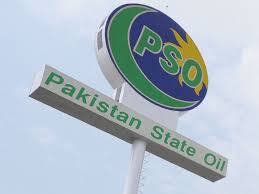ISLAMABAD: State-owned oil giant Pakistan State Oil (PSO) had suffered above Rs 38 billion as finance cost of the circular debt during the last nine years, starting from July 2008 to March 2017, it was learnt.
Documents available with Pakistan Today revealed that PSO has incurred total finance cost of Rs 79.3 billion from July 2008 to March 2017 while the recovery from power sector has only been Rs 40 billion, resulting into net finance cost of Rs 38.6 billion during this period.
According to details, PSO’s receivables swelled to Rs 292.3 billion on 30th Aril 2017 as power sector default against furnace oil supplies was at Rs 251.2 billion, while various price differential claims stood at Rs 9.6bln, Rs 15.8 bln of SNGPL against LNG supplies and pending amount with PIA at Rs 15.7 billion.
The inter-corporate circular debt of the power sector stemmed mainly starting 2008 and got aggravated in later periods due to surge in fuel oil prices, whereby the entire burden of increase in cost of electricity generation was not transferred to end consumers in the electricity tariff and borne by the government through power sector subsidies.
After settlement in June 2013, PSO’s receivables were reduced to Rs 46 billion. However, the circular debt resurfaced subsequently due to continuous short payments by the power sector against supplies made by PSO.
According to budget allocation for power sector subsidies, the budget allocation for power sector subsidies had been Rs 430 billion (1.7 per cent of GDP) in 2013-14, Rs 221 billion (0.7%) of GDP) in 2014-15, and Rs 118 billion (o.4%) of GDP) in 2015-16. The increasing power supplies coupled with government efforts to significantly reduce load shedding would require matching increase in subsidy to combat with circular debt issue.
PSO is the main fuel supplier to furnace oil based power plants (GENCOS, HUBCO & KAPCO) as other OMCs have either stopped sullying or focusing on cash customers. Due to circular debt situation, HUBCO, KACO along with GENCOs defaulted in their payment commitments to PSO under their respective fuel supply agreement (FSA) from April, 2008 onwards.
Owing to contractual arrangements and government directives, PSO had to maintain uninterrupted supplies to these power plants despite perpetual defaults in payments. These entities, however, have conveniently shifted their circular debt burden on PSO by matching their payables to PSO with their receivable from the power purchaser (CPPA), resulting in effective hedge.
According to state-owned oil giant, PSO cannot afford to use this hedge strategy against its payables as fuel oil for these power plants is imported against L/Cs (letter of credits). Similarly, any default by PSO against its local or international payment commitments would jeopardize the whole energy supply chain of the country and eventually increase load shedding. Therefore, PSO has to find the circular debt through bank borrowings which as of April 30, 2017 are Rs 142.2 billion with annual finance cost of Rs 5.8 bln. “In this regard, PSO has also incurred finance cost of Rs 38.6bln from July 2008 to March 2017, which has negatively impacted PSO’s profitability and return to Non-GoP shareholders,” said PSO.
The PSO further said in order to finance circular dent and meet its commitment to international oil suppliers, PSO has had to increase its bank borrowings and defer its payments to local refineries. This has resulted into huge financing cost on one hand and reduction of supply from local refineries on the other hand. Local refineries diverted their volume from SO to other Oil Marketing Companies (OMCs) that resulted into loss of market share and earnings besides incurring financing cost. Also, financing cost of circular debt wiped off major portion of PSO’s earnings and forcing major cut in dividends payment to its shareholders including the government.
It is pertinent to mention here that timely clearance of circular debt was imperative for creating fiscal space within energy supply chain. Principal decision that government has to take is whether the burden of debt clearance should be borne by the government through budgetary measures or should be borne directly by end consumers.




